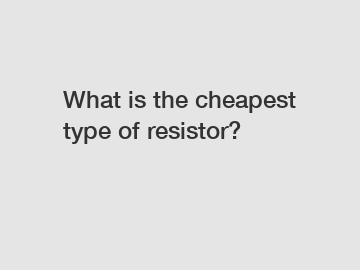What is the cheapest type of resistor?
What is the cheapest type of resistor?
When it comes to electronic components, resistors are one of the most commonly used elements. They are passive devices that impede the flow of electric current and can be found in almost every electronic circuit. However, with the plethora of resistor options available in the market, it can be challenging to determine the most cost-effective option. So, what is the cheapest type of resistor? In this article, we will explore different types of resistors and compare their cost-effectiveness, providing you with essential insights to make an informed decision.
1. Carbon Film Resistors:

One of the most inexpensive options available, carbon film resistors are widely used due to their low cost and reliability. They are created by depositing a thin layer of carbon film onto a ceramic rod, which acts as a resistor body. Carbon film resistors have tolerances ranging from 1% to 10%, offering a wide range of applications. While they have relatively low precision, they are suitable for many general-purpose electronic circuits where exact values are not critical.
2. Metal Film Resistors:
Metal film resistors are an upgrade from carbon film resistors, providing better precision and accuracy. They are manufactured by depositing a thin film of metal, such as nickel-chromium or tin oxide, onto a ceramic or glass substrate. Metal film resistors typically have tolerances of around 1% or lower, ensuring better accuracy in circuit performance. Although their prices might be slightly higher compared to carbon film resistors, they offer improved stability and reduced noise interference.
3. Thick Film Resistors:
Another option to consider is thick film resistors. These resistors are made by screen-printing a resistive paste mixed with a specialized binder onto a ceramic substrate. Thick film resistors generally have tolerances up to 5%, making them suitable for many applications. While they might be slightly more expensive than carbon or metal film resistors, they offer good stability and a wide range of resistance values.
4. Carbon Composition Resistors:
Despite becoming less prevalent in recent years, carbon composition resistors are still worth mentioning. These resistors are constructed by mixing carbon particles with a ceramic material and binding them together. They have tolerances ranging from 5% to 10% and are known for their robustness and ability to handle high-energy pulses. While carbon composition resistors may not be as precise as other types, they can be considered for applications requiring high surge handling capabilities.
Conclusion:
In conclusion, when it comes to affordability, carbon film resistors are the cheapest option available. They provide a cost-effective choice for general-purpose applications where precision is not a primary concern. For improved accuracy and stability, metal film resistors are a step up, with slightly higher prices. Thick film resistors offer a good balance between cost and performance, making them suitable for various applications. Although carbon composition resistors are not as common nowadays, they still have their place in applications needing high surge handling capabilities. Ultimately, the choice of the cheapest type of resistor depends on the specific needs of your electronic circuit and your budget constraints.
Contact us to discuss your requirements of resistor manufacturing factory, Metal Oxide Film Resistor Supplie, wholesale power resistor. Our experienced sales team can help you identify the options that best suit your needs.
404
0
0


Comments
All Comments (0)